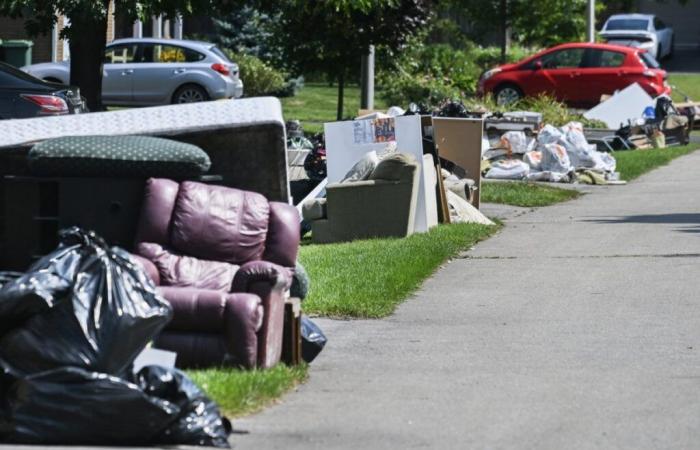MONTREAL — The Quebec government has paid compensation for less than 10% of the approximately 10,000 claims it had received since the remnants of Hurricane Debby passed through in August, which caused severe flooding and widespread damage.
Four months after the storm, a total of 10,076 claims were received. Of this number, Quebec made payments in 720 files, or approximately 7%, mainly in Mauricie and Lanaudière, two neighboring regions on the north shore of the St. Lawrence.
In Montreal, where the storm dumped 150 millimeters of rain in a short time, the government has reimbursed only nine of the 1,900 compensation claims received, despite a suggestion from Prime Minister François Legault that it would expand access to water. financial aid to flood victims.
Although some cases are still open, many residents who suffered damages amounting to tens of thousands of dollars feel abandoned by municipal and provincial authorities. They feel that different levels of government have given them reason to hope for help — only to make them understand that they should fend for themselves.
“The government’s promise to expand aid was window dressing: in fact, they just played with words,” said Isabelle Leblanc, a resident of Terrebonne, a suburb of Montreal, whose basement was flooded, causing $45,000 in damage.
The storm hit southern Quebec on August 9 and 10, washing away roads, knocking out power to half a million homes and flooding thousands of homes. In many areas, basements filled with several meters of sewage after sewers were overwhelmed, destroying floors, walls and furniture.
In September, the Insurance Bureau of Canada estimated that the storm was the costliest weather event in Quebec history, surpassing the 1998 ice storm. According to early estimates, the remnants of Hurricane Debby caused nearly $2.5 billion in insured losses.
Confusion
After the storm, Premier Legault suggested that his government could temporarily expand a provincial aid program that aims to financially support victims of disasters.
The program usually compensates victims for damage caused by overflowing lakes and rivers, but Mr. Legault said it could be expanded to include sewer backups. Private insurance generally covers sewer backups, but many people have suffered more damage than their insurance could cover.
“Why was there a sewer backup? It’s because there was a flood,” underlined Mr. Legault during a visit to Louiseville, in Mauricie, a few days after the storm passed. “So, at some point, we have to use common sense,” the Prime Minister said, opening the door to putting in place exceptional programs to respond to an exceptional situation.
The news made waves within several municipalities, which transmitted the message to their residents. However, in the weeks that followed, it became clear that the rules of the program had not actually changed.
Public Safety ensures that it has adopted a flexible approach to evaluating claims and emphasizes that sewer backups caused by the overflow of a nearby watercourse may be admissible. Homeowners who don’t live near a waterway, on the other hand, are out of luck.
The program website encourages people who are unsure of their eligibility to submit a claim.
In Laval, a large city that was hit hard by torrential rains, the Quebec government paid compensation in 21 claims out of more than 2,100. In the region that includes the South Shore of Montreal, 39 claims out of more than 1,700 have been settled. In total, the Quebec government reimbursed residents approximately $24 million.
A Public Safety spokesperson said these numbers are preliminary and many files are still open, awaiting supporting documentation from applicants. Homeowners also have one year to file a claim. And the number of settled claims has increased in recent weeks, from 580 in mid-November to 720 most recently.
Not eligible
But many residents’ requests were summarily rejected. Isabelle Leblanc, in Terrebonne, received a letter in mid-October telling her she was not eligible because the flooding in her basement was caused by a sewer backup, which should be covered by private insurance. His insurance was capped at $20,000, covering less than half of his losses.
Janice Donnelly, a resident of Dorval, on Montreal’s West Island, said she also suffered $45,000 in damages. She spent hours gathering all the documents needed to submit an application to the government, only to be told the program was not for her.
Ms Donnelly, 70, said she had to dip into her retirement savings to pay for the repairs. “I’ll have to die sooner,” she joked.
Other flood victims simply didn’t bother to submit an application to Quebec once they realized the rules hadn’t changed. Sara Beaudet, a Laval resident, said an employee at her MP’s riding office told her after the storm that the disaster program was being expanded and she might qualify. When she spoke to him again shortly after, he told her that was no longer the case.
Many owners have also submitted requests to their municipality, with similar results. Cynthia Czaharyn, a resident of another Montreal suburb, recently received a letter from her city. “This rain constitutes an unexpected, unpredictable event (…) beyond the control of the City and is therefore considered a case of force majeure,” we can read in the letter. “The City is therefore not responsible for any damage you may have suffered.”
The City of Montreal claims to have received more than 4,600 claims after the August storm, but has not paid any compensation. “The intensity of the rain on August 9 was exceptional and far exceeded the design criteria for sewer systems,” a spokesperson wrote in a statement. No network is designed to capture such amounts of rain in a short time.”
In its economic update published in November, Quebec estimated that the damage caused by Debby would cost the government $250 million, including $100 million for individuals and businesses through the General Disaster Financial Assistance Program. .
Nicolas Milot, interim director of ecological transition at the Montreal Metropolitan Community, which represents 82 municipalities in the metropolitan region, said the provincial program should be expanded to include sewer backups caused by “urban runoff.”
For the moment, however, many citizens feel cheated. Vanessa Lalonde, who lives in the western suburbs of Montreal, discovered after the storm that her insurance did not cover sewer backups at all. Then, her partner received a phone call telling him that they would not be eligible for provincial assistance.
Her children, whose bedroom is in the basement, slept in the living room for three months while she and her partner worked on the repairs, little by little.
“If (the government) had not said anything, I would not have been outraged,” she said. But they promised help that never came.”






